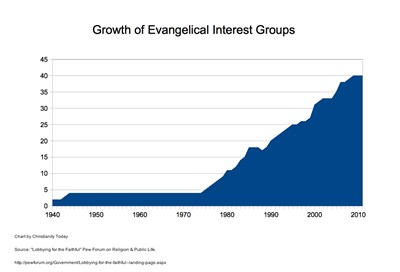In 1976, a Time cover story on evangelicals focused on the rise of a "New Empire of Faith," And despite the name, the evangelical "empire" was apolitical. There were few organized political efforts led by evangelicals. This is no longer the case. According to a new study by the Pew Forum on Religion and Public Life, the number of evangelical interest groups has grown steadily from just a few three decades ago to over 40 today. Pew found over 200 faith-based interest groups representing both large and small religious groups. Of these, almost one in five are groups that represent evangelicals and their churches.

Before the 1980s, the few evangelical interest groups that existed were those who represented institutions. The National Association of Evangelicals, the Baptist World Alliance, the Council for Christian Colleges and Universities, and others represented churches, colleges, and other religious organizations in the nation's capital. The National Religious Broadcasters Association, American Association of Christian Schools, and others have since formed to advocate for religious institutions. Beginning in the late 1970s, however, evangelicals formed grassroots organizations to represent voters. Today, most evangelical interest groups represent individuals, not institutions.
The first wave of grassroots organizing began in the late 1970s when the Christian Right came onto the political scene. Groups like the Moral Majority, Traditional Values Coalition, Concerned Women for American, and the Family Research Council focused on social issues like abortion, pornography, and sexuality. There were also other groups such as Focus on the Family and the American Family Association that provided the media presence needed for these early Christian Right groups to organize.
A second wave of Christian Right groups formed in the late 1980s and early 1990s. More likely to include charismatic and Pentecostal Christians, this wave was typified by the Christian Coalition. The Christian Coalition was formed using the network of activists who supported Pat Robertson's failed presidential bid in 1988.
The growth of evangelical groups has not been limited to grassroots groups, however. One area of growth has been legal advocacy groups. The American Center for Law and Justice, the Alliance Defense Fund, and Liberty Council are some of the groups who have focused on shaping the law through their legal advocacy. In the 1990s, these groups were successful in shaping case-law on religious liberty and other constitutional issues.
Evangelical groups have also been formed to address social justice issues. World Vision, World Relief, and the Salvation Army have lobbying arms to advance government programs aimed to help the poor and other marginalized groups. The Evangelical Environmental Network is a coalition that promotes environmental causes, most recently the harmful effects of mercury.
The report by Pew provides the most comprehensive list of religious groups available. Still, there have been some questions about the content of the list of groups. Some Christian groups are listed as "interreligious" if they are not limited to a specific Christian tradition. Family Research Council, Sojourners, and Bread for the World are listed in the same category as broader ecumenical organizations like Faith in Public Life and the Interfaith Alliance. Like previous scholarship on religious interest groups, Pew includes secular groups that advocate for religious freedom, even though the groups do not claim to be religious.
The trajectory for the growth of evangelical interest groups is unlikely to change in the coming years, but it might accelerate. Political parties in the U.S. are weak, and new campaign finance rules have given interest groups more, not less power. As with other parts of society, evangelical churches and their members will likely find more reasons to enter into politics and expand more and more into public policy.

Support Our Work
Subscribe to CT for less than $4.25/month


















